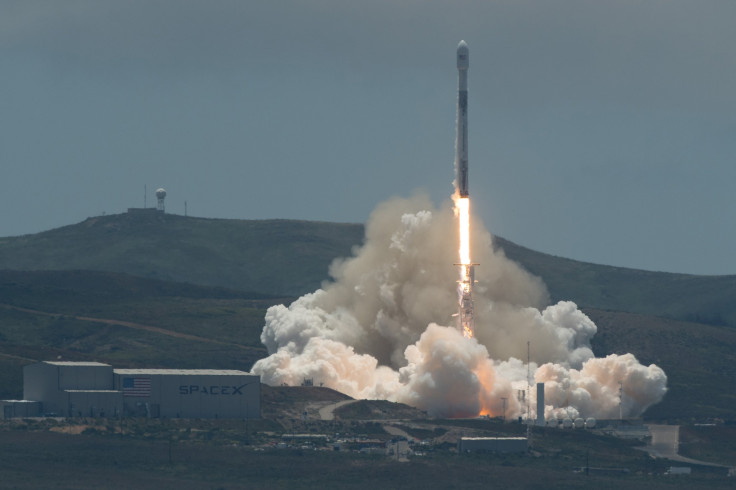SpaceX Wins Its First Falcon Heavy Contract — With the Air Force

SpaceX claimed the title of "world's biggest rocket-ship maker" four months ago, dethroning Boeing's (NYSE:BA) Delta IV rocket in the process.
This article originally appeared in The Motley Fool.
With a payload capacity of 63.8 metric tons to low earth orbit, each SpaceX triple-core Falcon Heavy booster can launch twice as much cargo into orbit as can Delta IV Heavy. Perhaps more important, with a base launch cost of just $90 million, Falcon Heavy can launch that cargo for just a fraction of the price United Launch Alliance (Boeing's joint venture with Lockheed Martin(NYSE:LMT), aka "ULA") charges for the service.
And if you think these two facts might appeal to the U.S. Air Force, you're right.
First a car, now a satellite
SpaceX's first Falcon Heavy launch was as much a publicity stunt as a technology demonstration, launching Elon Musk's personal Tesla Roadster sports car into a solar orbit past the reach of Mars -- but generating no revenue for SpaceX. Its second launch, in contrast, will put money in the bank. In late June, the U.S. Air Force awarded SpaceX a $130 million order to put "Air Force Space Command-52 satellite [into] its intended orbit."
As the Pentagon explained, this launch won't actually take place until September 2020, but already, you can see the writing on the wall for ULA. This is because, if you read closely, the Pentagon noted that it received "two proposals" to launch AFSC-52 into orbit.
Now, aside from SpaceX, the only U.S. launch provider capable of launching payloads this big is ULA. So, while the Pentagon didn't identify SpaceX's rival by name, this almost certainly means SpaceX beat out ULA to win this contract -- and saved taxpayers a bundle in the process.
What SpaceX's win means to you
I think we can all agree that SpaceX growing from rocket-less start-up to biggest rocket-maker on the planet in 16 years flat (Musk only founded SpaceX in 2002) is a pretty cool story. The fact that it's done this while cutting the price of rocketry makes the SpaceX story even better. But beyond that, what does this news mean for investors?
Here's how I think investors should be thinking about this news: First and foremost, no matter how cool you think it is, you still can't invest in SpaceX (except maybe in this one way). What you can do, though, is invest in the knock-on effects from SpaceX's success by avoiding bad investments and seeking out better ones.
On the bad front, with each passing day, I'm more and more convinced that Boeing and Lockheed's ULA joint venture is doomed to fail. Ever since the U.S. Air Force certified SpaceX's Falcon 9 medium lift rocket to carry payloads four years ago, Falcon 9 has won every bid for such missions in which it competed against Atlas V rockets bid by ULA.
As for Falcon Heavy, it has only launched once and only been bid against a ULA Delta IV for a USAF contract once, but it's won that one contract, so it's also batting a thousand.
For government launches, SpaceX is charging an average of $96.9 million for Falcon 9 launches, and (so far) $130 million for Falcon Heavy launches. Red tape attendant on launching for the government requires SpaceX to mark up its prices by about 50 percent from the $62 million/$90 million "list costs" it advertises for commercial launches. But even so, SpaceX charges far less than ULA's most recent best price -- $177.4 million for a launch.
Thus, ULA's prices remain far above what SpaceX is charging. As long as price is an object in these missions, it's logical to assume that SpaceX will beat ULA to win contracts more often than not. At the same time, ULA has drastically cut its prices from the $400 million or more it was charging for Delta IV missions just a few years ago. ULA is to be commended for cutting its costs and bringing down its prices, at great benefit to the taxpayer. Still, this means ULA is bringing in a whole lot less revenue each time it launches, a fact that could imperil the joint venture's profitability in future years -- and imperil the $400 million in annual profits ULA passes along to parent companies Boeing and Lockheed.
While this doesn't necessarily make Boeing and Lockheed bad investments (combined, the two companies earned more than $10 billion last year, according to data from S&P Global Market Intelligence), it does suggest that neither one will benefit fully from the rapid growth of America's space industry.
Long story short: If you want to find winning investments, you're going to need to look elsewhere.
Rich Smith has no position in any of the stocks mentioned. The Motley Fool has no position in any of the stocks mentioned. The Motley Fool has a disclosure policy.











